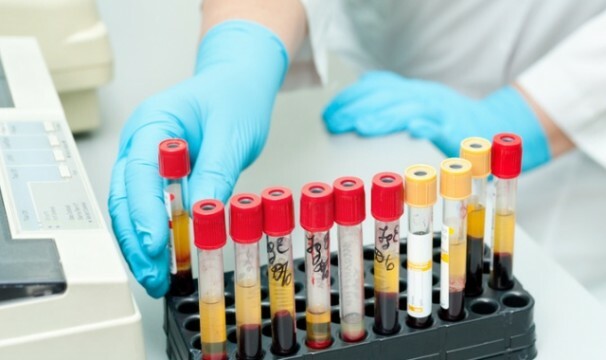One of the main hormones during pregnancy is progesterone. This is a special steroid hormone in the body of men and women. In the body of a woman, for the production of the pregnancy hormone, the yellow body responds in the post-oovulatory period. Also, the hormone produces the placenta during pregnancy and the adrenal glands at any time. Progesterone is produced mainly from cholesterol. With this hormone, conception occurs and pregnancy continues. But in fact, its influence spreads much wider.
Progesterone rate during pregnancy

The amount of hormone in a woman during pregnancy varies. Its content in the blood is affected by many factors. There are generally accepted norms, which must correspond to the content of progesterone in the blood. Exemplary levels of acceptable levels of the hormone are recorded in the table, depending on the early or late pregnancy.
| The gestational age in weeks | The concentration of progesterone nmol / l |
| 5 - 6 | 18.57 +/- 2.00 |
| 7 - 8 | 32.98 +/- 3.56 |
| 9 - 10 | 37.91 +/- 4.10 |
| 11 - 12 | 42.80 +/-4.9 |
| 13 - 14 | 44.77 +/- 5.15 |
| 15 - 16 | 46.75 +/- 5.06 |
| 17 - 18 | 59.28 +/- 6.42 |
| 19 - 20 | 71.80 +/- 7.76 |
| 21 - 22 | 75.35 +/-8.36 |
| 23 - 24 | 79.15 +/- 8.55 |
| 25 - 26 | 83.89 +/- 9.63 |
| 27 - 28 | 91.52 +/- 9.89 |
| 29 - 30 | 101.38 +/- 10.97 |
| 31 - 32 | 127.10 +/-7.82 |
| 33 - 34 | 112.45 +/- 6.68 |
| 35 - 36 | 112.48 +/- 12.27 |
| 37 - 38 | 219.58 +/- 23.75 |
| 39 -40 | 273.32 +/- 27.77 |
The table clearly shows that the hormone level norm is directly related to the obstetric term of pregnancy. But sometimes the amount of progesterone can change its performance. This can be affected by:
- heredity,
- medication,
- individual features of the body.
In this regard, after receiving the results of the analysis, do not draw conclusions based on the numerical values. Only an experienced specialist can explain to you what is included in the result sheet. He will appoint, if necessary, a course of treatment.
Abundance of the hormone during pregnancy
Elevated progesterone can be detected with difficulties of placental development, the development of the cyst of the yellow body and not only. The causes can be:
- problems in the adrenal function, which begin to produce an increased amount of progesterone;
- kidney failure;
- prohibited during pregnancy medications.
Symptoms and consequences of excess hormone level

Consequences of excessive hormone excess can be fraught for women's health and for a child's future can lead to fetal death or forced abortion .With excess pregnancy hormones, there are:
- problems with vision;
- apathy;
- fatigue;
- disorientation in space.
If you notice these symptoms, do not self-medicate. And as soon as possible, contact a specialist.
Excess progesterone in early pregnancy
It also happens that the rate rises in the first trimester of pregnancy. But it is asymptomatic. And then the consequences can be unpredictable: Multiple pregnancy, problems in the growth of the placenta, adrenal gland failure, renal failure.
4 week
The concentration of the hormone in the early stages continues to grow. Progesterone in the first trimester is produced by the yellow body until the placenta is formed. It is the placenta in the future that will create progesterone. This hormone affects pregnancy not only at week 4, but throughout pregnancy. The "duties" of progesterone include:
- preparing the uterus for fetal enlargement;
- preventing the threat of miscarriage;
- accumulation of the subcutaneous fat layer;
- in order to reject the fetus, the hormone reduces immunity.
And also provides development and growth of the breast, makes the pelvic ligaments more elastic, participates in the formation of the fetus. These symptoms are the main preparation for childbirth.
Week 5
During the fifth week, the following symptoms accompanying early pregnancy are observed:
- at the initial stage;
- constipation;
- morning heartburn.
Strengthened production of progesterone relaxes the muscles of the uterus. To protect the fetus, the same hormone causes constipation, preventing the passage of food through the intestine.
Fast fatigue is evident. There is an acute reaction to smells. Some foods and odors cause vomiting. Appetite may disappear. A woman during this period should reconsider her diet. You need to drink more water, eat more fiber.
6 week
At the 6th week of pregnancy, the hormone level becomes higher. It reaches 16-20 nmol / l. If the indicator fluctuates at such an early time in one or the other direction, then there are some violations.
If the indices are higher than acceptable, then this can be a bladder drift, a complication in the development of the placenta.
Multiple pregnancy also increases the level of progesterone. With spontaneous miscarriage, ectopic pregnancy, delayed development of the fetus, on the contrary, there is a decrease in the hormone.
Progesterone injections

If the hormone count falls extremely, prospective mothers are prescribed progesterone injections. The injections can be replaced with tablets. Do not be afraid of injections during pregnancy. Progesterone injections in the early and late periods will not harm you or your baby. On the contrary, they will make pregnancy calmer, and the baby is healthier.
Injection is done under the skin or in the muscle. Intramuscular injection is considered more traditional. But it must be performed by an experienced doctor.
How to maintain the level of progesterone is normal?
To keep the hormone at the level of normal performance, you need not so much. Namely:
- sleep well;
- eat right;
- is not nervous about trifles;
- should be cautious about taking strong, hormonal medications.
And pass all tests before planning pregnancy. For the normalization of the hormone, the doctor can prescribe drugs on a hormonal basis, in which there is progesterone. It can be Utrozestan in suppositories, Dyufaston, Femoston in tablets. Treatment is selected for a specific patient, taking into account the particular complications.
If the life of a woman or a future child is in danger, the expectant mother is transferred to the hospital to save .In the hospital, under the supervision of doctors, fluctuations in progesterone in the blood are monitored. If necessary, resort to hormone therapy.
At the end of the treatment systemic monitoring of the hormone in the body. For this you need to periodically give blood for analysis. This will help in time to detect abnormalities and begin treatment.
The norm of progesterone in pregnancy is the guarantee of the health of the future mother and her baby.



